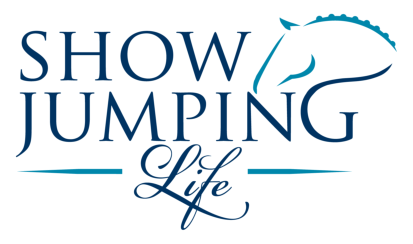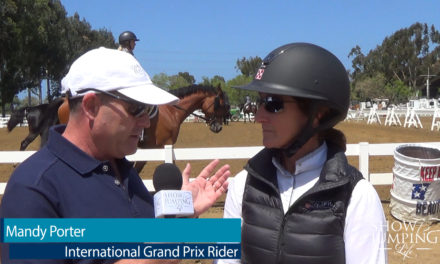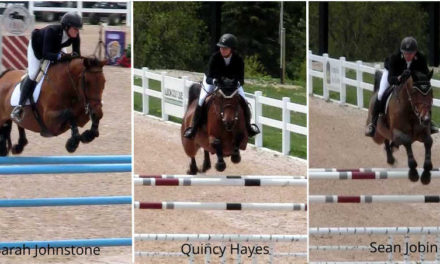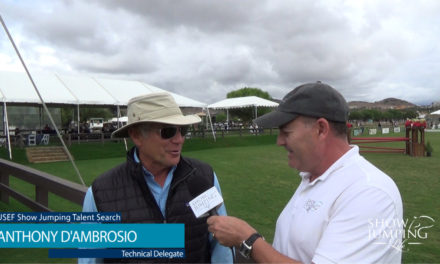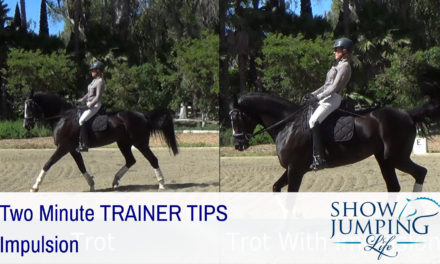Show Jumping Success Stories
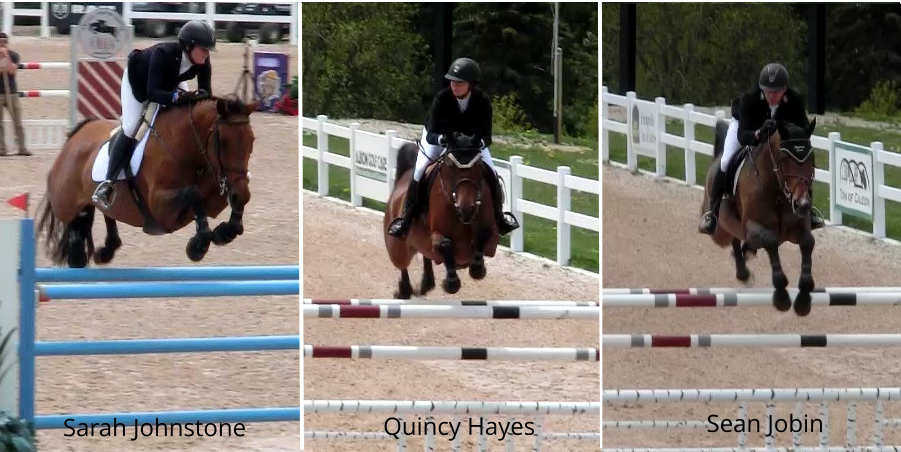
An Interview Series Examining The Rise Of Three Young Canadian Show Jumping Professionals
Part 3: The keys to success
Have you ever wondered what it’s like to be a young professional trying to make your way in this sport? Me too! In this three-part series, I sit down with three successful young Canadian show jumping professionals to learn how they went from the pony ring to growing their current businesses and competing in FEI ranking classes. In these articles, the riders and I discuss:
- Their background and path to becoming a professional;
- Their thoughts on training and coaching, and;
- Their personal riding careers and goals.
I interviewed Sarah Johnstone, Quincy Hayes and Sean Jobin, all of whom have had their share of success in the jumper and hunter rings as both juniors and now professional riders. Despite the different routes they have taken, they currently are all successful and respected trainers, riders, and horse people.
I met up with these three young professionals at the Caledon Equestrian Park to discuss their past, current thoughts on their careers and plans for the future. The final article of the series, presented below, covers their riding careers.
Rosalie: What qualities do you feel have allowed you to be successful as a rider?
Sarah: As a professional in this industry, you will face a lot of difficult situations. I believe it is important that you know yourself and know how to behave in different circumstances. I was lucky to learn from a number of top professionals and to watch how they handle themselves in different scenarios, which I subsequently have applied to my own career. Of course, being mentally strong and hard working has also helped me a lot in my career.
You have to be adaptable
Quincy: At this level you have to be a hard worker. Without that quality, it is impossible to succeed. You also have to be adaptable. Despite how organized you may be, plans will inevitably change last minute and you have to be flexible and find solutions for these changes. Furthermore, since all three of us are young and new in the sport, we cannot be afraid to ask questions and take advice from other riders and trainers. It is an amazing sport to be involved in because you truly do learn something new every day. This sport is so complex and multi-factorial, so it is crucial to remember that no one is above getting help and looking at situations from different viewpoints.
Sean: With horses as a career, as with anything in life, you need to be passionate about what you are doing. This sport fills up the majority of your day; from arriving at the barn early in the morning to finishing past 8 pm. Free time is rare when working with horses! As a rider, you need to enjoy spending all of your time at the barn and horse shows or you will burn out quickly.
Rosalie: How do you go about ensuring your horses stay healthy?
Fitness should be a priority in your training program
Sarah: As trainers, since we know our horses so well and spend so much time around them, I believe it is important to trust your instincts when it comes to your horses’ well-being. Sometimes I will go to the barn on a day off just to spend some time with my horses and ensure they are looking and feeling good. If something doesn’t feel quite right it is important to address the issue immediately. In terms of reducing the risk of injury, fitness should be a priority in your training program; keeping horses fit reduces the likelihood of injury.
Quincy: Having a strong relationship with your veterinarian and physio team makes a big difference in managing your horses’ health. The more you communicate with the team around you, the better the health program for your horse will become. You also have to go the extra mile by staying on top of every detail that could be affecting your horses’ performance: a slight change in the way a horse carries themselves or a difference in their movement, could be the early signs of something more serious.
There are no short cuts
Sean: It definitively takes a trusted team managing your horses’ everyday routines. Cold hosing, poultice, wrapping: there are no short cuts if you want to maintain the health and soundness of horses performing at high levels in this sport. I am also very conscious of what a horse is capable of mentally and physically and will not push them past that point.
Rosalie: What horse has had the greatest influence/impact on your career so far?
Sarah: I would say different horses for different reasons. Two horses I rode for Jay Hayes, Starlet and Leonidas, kick-started my career, as they were the first horses I competed at the FEI level. Starlet and Leonidas taught me to be more competitive and gave me confidence to compete at higher levels. More recently, Bolocia was a great learning experience for me. Bolocia taught me that less can be more in training and that at times, you need to back off and listen to what the horse is telling you.
Quincy: Like Sarah, I definitely have a few horses. My equitation horse, Clarin, played an important role in my development as a rider. I was the primary rider teaching and giving him show ring experience and he later took me all the way to the Maclay finals. With him, I won the Jump Canada and Canadian Equestrian Team medal finals. He also highlighted my equitation ability, which led to my scholarship to Auburn University. Recently, Calgary 56 provided me with valuable FEI experience, allowing me to jump clear rounds throughout the Ontario and Florida circuits. We improved and learned together and he exceeded all of my expectations in a short period of time.
Sean: I am lucky that I have partnered with a lot of great horses throughout my career. Caillou was my first Grand Prix horse. I was given the ride by Mike Grinyer and the experience I gained with that horse was invaluable. He was a great first grand-prix horse, very quick and careful, which allowed me to secure good placings in most classes I entered. My current partner, Zindiloma, has been with me for four years now and with him I have been able to gain valuable FEI points and to jump bigger tracks.
Rosalie: What has been your greatest accomplishment?
Sarah: I will always remember my first FEI ranking class win in 2011 at the International Bromont with my mare, Starlet. In November of the year prior, again with Starlet, I finished 4th in the Big Ben Challenge at the Royal Agricultural Winter Fair. I am also very proud of our team’s second place finish in the U25 Nation’s Cup in WEF (2016).
Quincy: Like Sarah, the U25 Nation’s Cup we were both part of, was a career milestone. It was an amazing experience representing Canada. There was a large and supportive Canadian group there to watch and the team atmosphere was incredible. With Calgary 56, I was clear in the first round of the Canadian Championships at the Royal Agricultural Winter Fair last year. It meant a lot to have a good performance in front of many friends and family. Another important milestone was going clear in a 1.50m at WEF this past spring.
Sean: For me, a clear round in the Canadian Championship and an 8th place overall finish at the Royal Winter Fair last year will always be a great memory. I have also had a number of Talent Squad and Grand Prix wins, as well as top 3 placings in FEI classes. It has been an amazing experience to have success on a number of different horses.
Rosalie: Ideally, how do you prepare for an important class?
Sarah: Everyday is different but generally I try to get up earlier. I try to be as “hands-on” as possible on that day. It gives me confidence to be involved in my horse’s daily preparation, knowing exactly how my horse is feeling on that day. Also, my mentor Jay Hayes taught me the importance of taking some time for yourself before the class starts. Even if it is just 2 minutes sitting alone on the golf cart, I need to take time to “zone in” before the competition frenzy begins.
Quincy: In contrast to Sarah, I will try to sleep in a bit the morning of an important class! During the day, I make sure to eat properly and try to maintain a routine. I try to plan my day to take care of my coaching duties earlier, so that I can focus on giving my students attention before I begin to focus on my class. I like to ride my horse a certain amount of time before the class’ posted start time. I also make sure that I am involved with the preparation of my horse throughout the day, whether it is lunging a fresh horse or helping braid before the class. Another important thing for me is to walk the course twice: once with my trainer and once alone. It helps me focus and gives me a moment by myself before the class. After the class I always try to make time to put my horse away. That’s an opportunity for me to observe how the horse feels after the class and to make sure that there is nothing abnormal.
Sean: I don’t think I do anything too differently to be honest! I keep myself busy during the day and I make sure I don’t treat it any different than any another class. I usually have client and young horses that I am working with throughout the day, so I make sure to get that work done well in advance of when my class will start. I focus on having a good training program and methodically teaching my horses new skills that they will need to compete in the ring. Therefore, when the time comes to compete, all my horse and I have to do is execute what we know we are capable of.
Previous Articles: Part 1 – Path To Show Jumping Professionalism & Part 2 – Show Jumping Training Philosophy
About the riders:
Quincy Hayes with her mom, Darcy
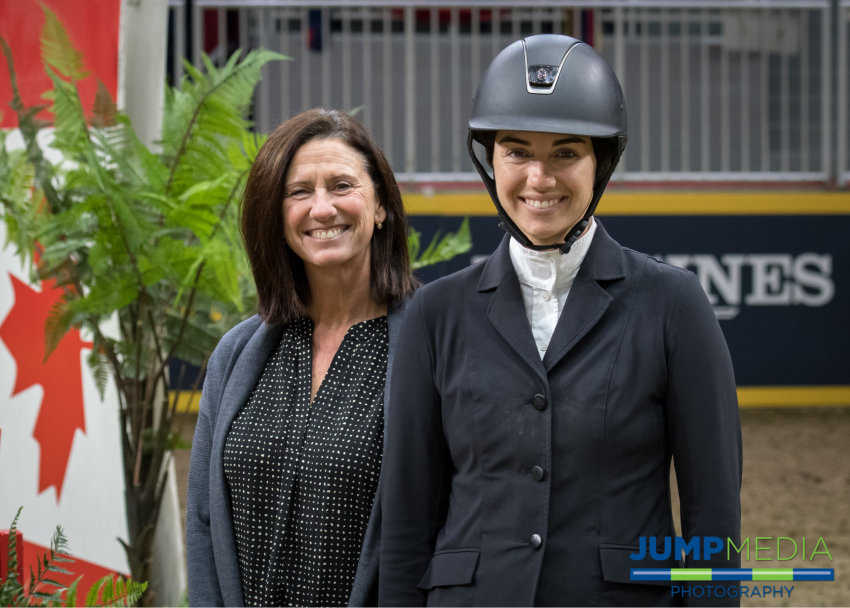
Photo courtesy Jump Media
Quincy Hayes first began her competitive career at the age of 5 and has been achieving top results in the jumper, hunter and equitation rings ever since. During her junior years, Quincy was a fierce competitor in the equitation ring in the United States and Canada, winning the CET Medal and Jump Canada Medal finals. Following her junior career, Quincy was awarded an athletic scholarship from Auburn University to compete for their varsity equestrian team and was a member of the 2011 and 2014 NCAA Championship winning teams. In the summer of 2015, Quincy acquired her first Grand Prix horse (Calgary 56) and in just two short months of showing, qualified for the National Talent Squad finals, finishing 6th overall. The following year Quincy was on the same 2nd placed Canadian team as Sarah in Wellington, FL for the U25 team competition. In 2016, Quincy burst onto the FEI scene with many top results, finishing her season with a strong performance in Toronto, posting two solid rounds in the Canadian Championships and a 2nd place finish in the U25 Championship (the top placed Canadian).
She is now Co-Trainer at Hayes LTD, alongside her mother Darcy, in Aurora, Ontario. At Hayes LTD she teaches students from the pony ring up to the high Jr/Am jumper classes.
Sean Jobin
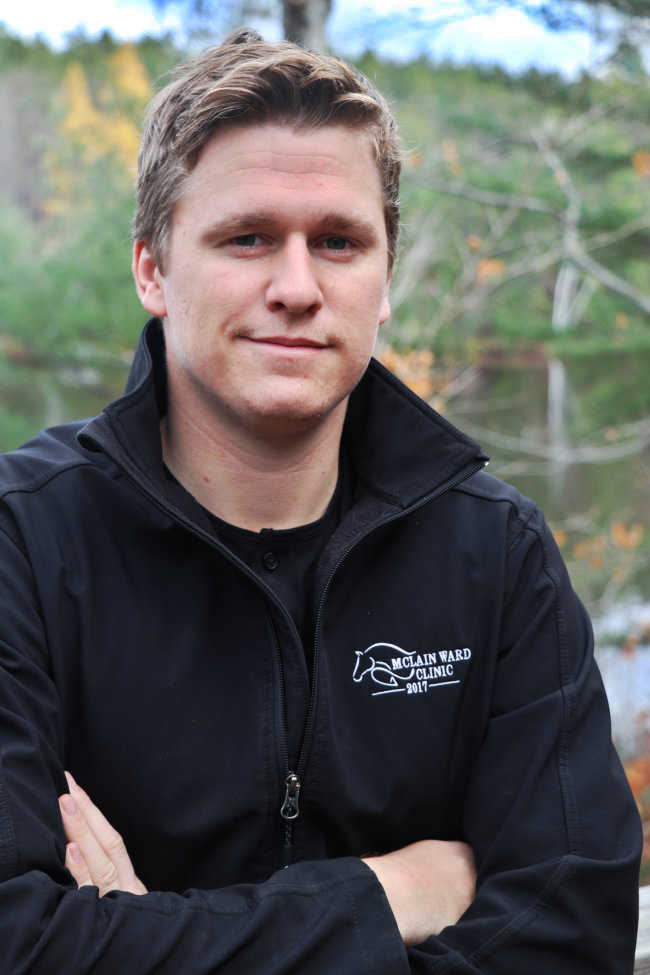
Sean Jobin had great visibility as a junior rider, showing many different horses in the hunter and jumper rings. Following a productive junior career, Sean turned professional at 18, immediately getting hired as a rider by trainers in Canada to showcase their sales and young horses. During this time, he picked up a number of Modified Grand Prix and Talent Squad wins. These results were even more impressive given that they came on sale horses that Sean had the ride on for only a short period of time.
Sean continues to focus on developing horses for the jumper and hunter rings through his business in Canada, while also competing at the Grand Prix level for Foxridge Farms.
Sarah Johnstone (left) with Olympic Show Jumper, Beth Underhill
Sarah Johnstone has been relied upon since she was 8 years old to showcase hunters and jumpers by top industry professionals. As a junior rider, she was the youngest person, at 15 years old, to win both the Canadian Equestrian Team (CET) and Jump Canada Medal finals in the same year. In 2010 during her first year as a professional, after a successful summer winning many grand prix titles, Sarah was 3rd at the Canadian Championships. Recognizing her passion and achievements, in 2011 the North American Riders Group (NARG) chose Sarah, then just 20 years old, to receive its inaugural $15,000 grant awarded to an emerging rider dedicated to the sport of show jumping. In 2016, Sarah finished 7th overall in the Under 25 (U25) rider series in Wellington, Florida; and was a member of the 2nd place Canadian team in the U25 series.
She is currently head trainer at Wingberry Farm in Nobleton, Ontario.
